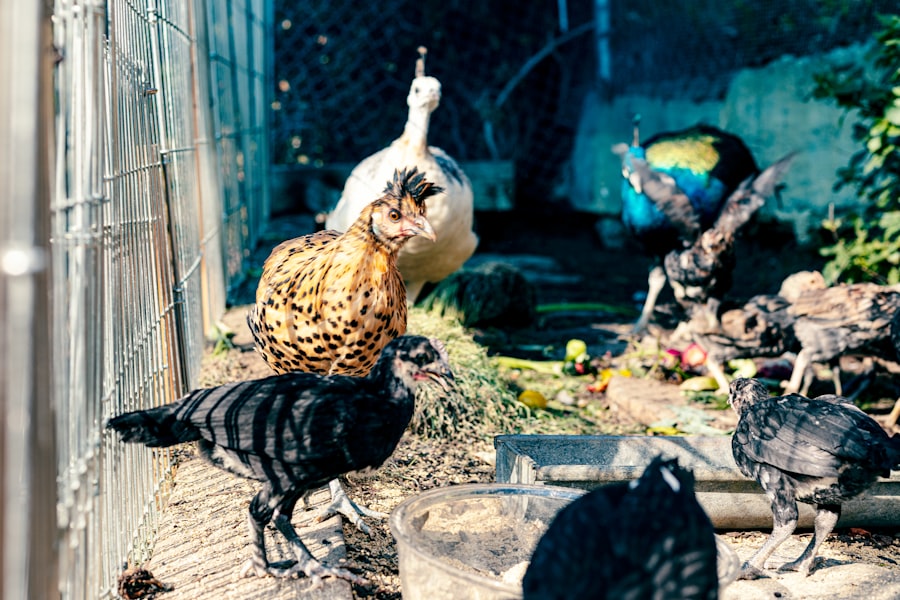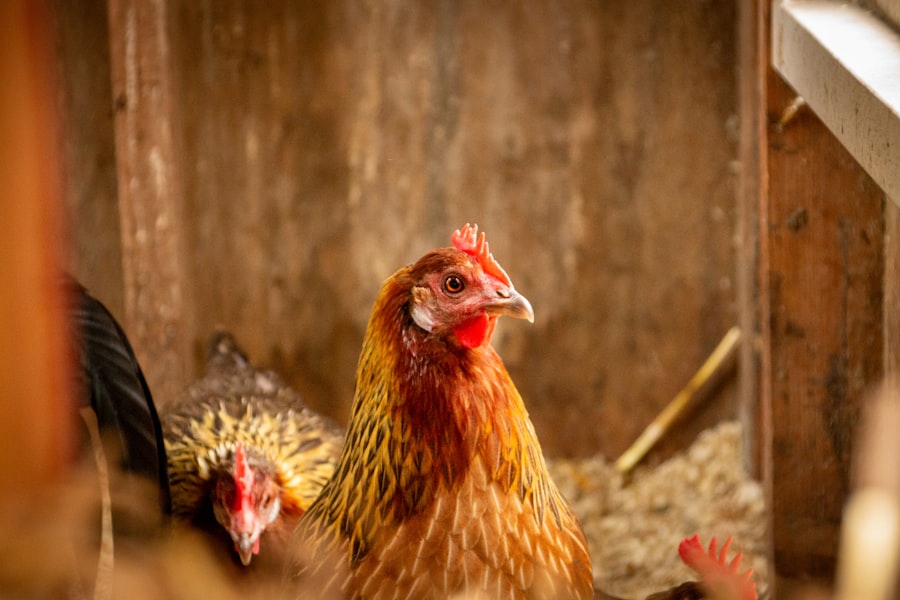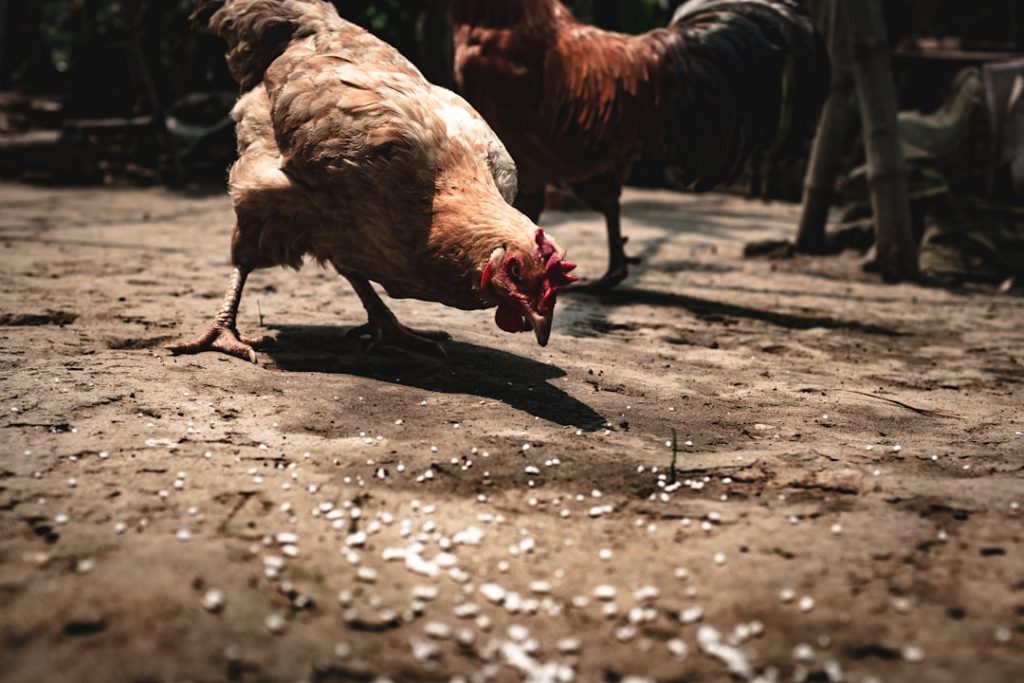Selecting the appropriate chicken breed is essential for successful poultry raising. Numerous breeds exist, each with distinct traits and requirements. Some breeds excel in egg production, while others are valued for meat.
When choosing a breed, consider your specific goals and needs. For egg production, breeds like Rhode Island Red or Leghorn are known for high yields. For meat production, Cornish Cross or Plymouth Rock may be more suitable.
Climate adaptability is another important factor, as some breeds are better suited to cold environments, while others thrive in warmer conditions. Consider your local climate and the environment in which you’ll raise your chickens. Breed temperament and personality are also crucial considerations.
Some breeds are docile and friendly, making them ideal for families with children, while others are more independent and potentially challenging to manage. Choose a breed that aligns with your lifestyle and preferences. The ideal breed for your flock will depend on various factors, including your goals, local climate, and personal preferences.
Thorough research of different breeds and careful consideration of your specific requirements will help ensure you select the most appropriate chickens for your flock.
Table of Contents
- 1 Building a Coop
- 2 Providing Proper Nutrition
- 3 Ensuring Safety and Security
- 4 Maintaining Cleanliness
- 5 Handling Health and Wellness
- 6 Integrating Chickens into Your Lifestyle
- 7 FAQs
- 7.1 What are the benefits of keeping backyard chickens?
- 7.2 What do backyard chickens need to thrive?
- 7.3 How do I keep backyard chickens safe from predators?
- 7.4 What should I feed my backyard chickens?
- 7.5 How do I keep backyard chickens healthy?
- 7.6 Do backyard chickens require a lot of maintenance?
Key Takeaways
- Consider the climate, space, and purpose of raising chickens when choosing the right breed for your needs.
- When building a coop, prioritize ventilation, predator-proofing, and space requirements for the number of chickens you plan to keep.
- Provide proper nutrition by offering a balanced diet of commercial feed, fresh water, and occasional treats like fruits and vegetables.
- Ensure safety and security by regularly inspecting the coop for any potential hazards and implementing measures to protect against predators.
- Maintain cleanliness by regularly cleaning the coop, nesting boxes, and feeding areas to prevent disease and maintain a healthy environment for the chickens.
- Handle health and wellness by monitoring for signs of illness, providing regular veterinary care, and practicing good biosecurity measures.
- Integrate chickens into your lifestyle by considering the time and effort required for their care, as well as the benefits they can bring to your home and garden.
Building a Coop
Size and Space Requirements
When building a coop, it’s crucial to consider the size of your flock and the space requirements for each chicken. A general rule of thumb is to provide at least 2-3 square feet of space inside the coop and 8-10 square feet of outdoor space in the run for each chicken. This ensures that your chickens have enough room to move around, scratch, and engage in dust bathing.
Materials and Ventilation
In addition to size, it’s essential to consider the materials used in building the coop. The coop should be sturdy, predator-proof, and well-ventilated to prevent moisture buildup and ensure good air quality. Secure latches and locks are necessary to keep out unwanted visitors. Providing nesting boxes for your hens to lay eggs and roosting bars for them to perch on at night is also crucial.
Easy Maintenance and Location
The coop should be easy to clean and maintain, with removable roosts and nesting boxes for easy access. The location of the coop is also vital. It should be situated in a well-drained area with good sun exposure, protected from strong winds and extreme temperatures. By carefully planning and building your coop, you can provide a safe and comfortable home for your chickens.
Providing Proper Nutrition

Proper nutrition is essential for keeping your chickens healthy and productive. A well-balanced diet provides the essential nutrients that chickens need to lay eggs, grow feathers, and maintain overall health. The foundation of a chicken’s diet is a good quality commercial feed that is specifically formulated for their needs.
This feed should contain a balance of protein, carbohydrates, vitamins, and minerals to support their growth and development. Additionally, it’s important to provide access to fresh water at all times, as dehydration can quickly lead to health problems. In addition to commercial feed, chickens can also benefit from supplemental treats and foraging opportunities.
Fresh fruits and vegetables, mealworms, and kitchen scraps can provide additional nutrients and enrichment for your flock. It’s important to offer these treats in moderation, as overfeeding can lead to obesity and health issues. Additionally, allowing your chickens access to a secure outdoor area where they can forage for insects and plants can provide mental stimulation and natural behaviors.
Finally, it’s important to consider the specific nutritional needs of different stages of life. Chicks require a higher protein diet to support their rapid growth, while laying hens need additional calcium to support egg production. By providing a well-balanced diet that meets their specific needs, you can ensure that your chickens stay healthy and productive.
Ensuring Safety and Security
Ensuring the safety and security of your chickens is essential for their well-being. Chickens are vulnerable to a variety of predators, including raccoons, foxes, and birds of prey. It’s important to take steps to protect your flock from these threats by building a secure coop and run.
This includes using sturdy materials that are resistant to digging and chewing, as well as adding locks and latches to prevent predators from gaining access. In addition to protecting against predators, it’s also important to consider other potential hazards in the environment. This includes providing shade and shelter from extreme temperatures, as well as protecting against potential toxins or contaminants in the area.
It’s important to regularly inspect the coop and run for any signs of damage or wear, and make repairs as needed to ensure that your chickens are safe and secure. Finally, it’s important to consider the safety of your chickens within their social environment. Chickens have a natural pecking order, which can sometimes lead to aggression or bullying within the flock.
Providing enough space, roosting areas, and enrichment can help reduce stress and prevent aggressive behaviors. By taking steps to ensure the safety and security of your chickens, you can help them live happy and healthy lives.
Maintaining Cleanliness
Maintaining cleanliness is an important aspect of raising chickens. A clean environment helps prevent disease and parasites, as well as providing a comfortable living space for your flock. Regular cleaning of the coop and run is essential for maintaining good hygiene.
This includes removing soiled bedding, droppings, and uneaten food on a regular basis. Additionally, it’s important to regularly clean and disinfect waterers and feeders to prevent bacterial growth. In addition to regular cleaning, it’s important to provide adequate ventilation in the coop to prevent moisture buildup and ammonia levels from rising.
Good ventilation helps maintain air quality and prevents respiratory issues in your flock. It’s also important to provide dust baths for your chickens, as this helps them keep their feathers clean and free from parasites. Finally, it’s important to consider the cleanliness of your chickens themselves.
Regularly inspecting your flock for signs of parasites or illness can help prevent outbreaks and keep your chickens healthy. Providing regular opportunities for dust bathing and grooming can also help keep your chickens clean and comfortable.
Handling Health and Wellness

Creating a Comfortable Environment
In addition to regular health checks, it’s important to provide a comfortable environment that supports your chickens’ physical and mental well-being. This includes providing adequate space, enrichment opportunities, and social interactions within the flock. Additionally, it’s important to provide a well-balanced diet that meets their nutritional needs at each stage of life.
Preventative Measures
Preventative measures can also help maintain the health of your flock. This includes regular parasite control, such as deworming and treating for mites or lice. It’s also important to practice good biosecurity measures to prevent the spread of disease within your flock.
Emergency Preparedness
Finally, it’s important to be prepared for emergencies by having a first aid kit on hand and knowing how to respond to common health issues that may arise. By taking proactive measures to maintain the health and wellness of your flock, you can help ensure that they live long and healthy lives.
Integrating Chickens into Your Lifestyle
Integrating chickens into your lifestyle can be a rewarding experience that provides many benefits. Chickens can provide a sustainable source of fresh eggs, as well as natural pest control in the garden. Additionally, they can be entertaining pets with their unique personalities and behaviors.
When integrating chickens into your lifestyle, it’s important to consider how they will fit into your daily routine. This includes providing regular care and maintenance for your flock, such as feeding, watering, cleaning, and collecting eggs. It’s also important to consider how they will interact with other pets or family members in your household.
Additionally, it’s important to consider any local regulations or ordinances that may apply to keeping chickens in your area. This includes zoning laws, noise ordinances, and restrictions on flock size or breed types. By familiarizing yourself with these regulations and following them accordingly, you can ensure a smooth integration of chickens into your lifestyle.
Finally, integrating chickens into your lifestyle provides an opportunity for learning and personal growth. Raising chickens can teach valuable lessons about responsibility, self-sufficiency, and animal husbandry. By taking the time to integrate chickens into your lifestyle thoughtfully, you can enjoy all the benefits that they have to offer while ensuring a positive experience for both you and your flock.
In conclusion, raising chickens requires careful consideration of many factors including breed selection, coop construction, nutrition provision, safety measures implementation, cleanliness maintenance, health management practices adoption as well as lifestyle integration planning. By taking these aspects into account when raising chickens you can ensure a successful experience that benefits both you as well as your feathered friends!
If you’re interested in learning more about how to keep backyard chickens, you might also want to check out this article on chicken coop nest boxes. It provides valuable information on creating a comfortable and safe environment for your chickens to lay their eggs. This article, along with others on Poultry Wizard, can help you become a knowledgeable and responsible chicken owner. And if you’re considering expanding your flock, you might also find their article on duck mating season to be helpful.
FAQs
What are the benefits of keeping backyard chickens?
Keeping backyard chickens can provide a sustainable source of fresh eggs, natural pest control, and fertilizer for gardens. Additionally, chickens can be a source of entertainment and companionship.
What do backyard chickens need to thrive?
Backyard chickens need a secure coop or shelter to protect them from predators and the elements, access to fresh water, a balanced diet of chicken feed, and space to roam and forage.
How do I keep backyard chickens safe from predators?
To keep backyard chickens safe from predators, it’s important to secure their coop with sturdy fencing, lockable doors, and predator-proof latches. Additionally, consider using motion-activated lights or alarms to deter predators.
What should I feed my backyard chickens?
Backyard chickens should be fed a balanced diet of chicken feed that includes grains, protein, vitamins, and minerals. Additionally, chickens can benefit from occasional treats such as fruits, vegetables, and mealworms.
How do I keep backyard chickens healthy?
To keep backyard chickens healthy, provide them with regular access to fresh water, a clean living environment, and regular veterinary check-ups. Additionally, practice good biosecurity measures to prevent the spread of diseases.
Do backyard chickens require a lot of maintenance?
While backyard chickens do require regular maintenance such as cleaning the coop, providing fresh food and water, and monitoring their health, many find the maintenance to be manageable and rewarding.
Meet Walter, the feathered-friend fanatic of Florida! Nestled in the sunshine state, Walter struts through life with his feathered companions, clucking his way to happiness. With a coop that’s fancier than a five-star hotel, he’s the Don Juan of the chicken world. When he’s not teaching his hens to do the cha-cha, you’ll find him in a heated debate with his prized rooster, Sir Clucks-a-Lot. Walter’s poultry passion is no yolk; he’s the sunny-side-up guy you never knew you needed in your flock of friends!







